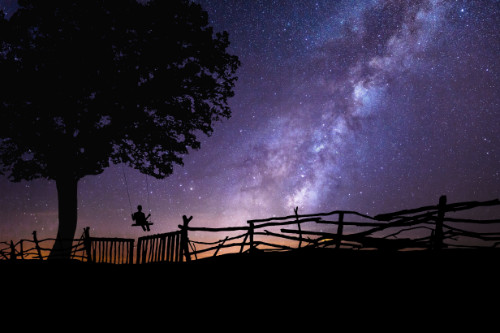Spiritual World and Earthly Life

Ole Skjerbæk Madsen
UFP, interfaith prayer meeting, June 11th 2016
Dear friends,
Once more, I should like to express my gratitude that UPF invites for these meetings. When Nobu and I talked about the topic for today, he also used the term the physical world along with earthly life. I’ll try to deal with the topic in this way. I’ll start with the high spiritual ideals and then turn to their realization in our daily life and especially in relation to physical world (the earth on which we live).
The vision of Christianity for life on this Earth is rooted in our belief in God as the Creator. God created everything good, and God created humans in God’s image as stewards of his creation. Humans failed in this; instead of stewardship we got exploitation, greed and egoism, self-interest instead of love. Jesus came to change this disorder and bring us back into right relations with God, so that we again may live according to God’s intention with creation.
The message of Jesus Christ could be summarized thus: “Repent, for the kingdom of heaven is at hand.” He calls us to repent or to re-orientate our life to the will of God. The term the kingdom of heaven or the kingdom of God is the expression of God’s vision for life on this earth.
The restored order of the world is at hand; it is here to see, to touch, to experience. Jesus is the focus of its realization. He establishes the new order: Those who suffer are healed from diseases, from evil spirts, from social alienation, from sin and guilt – and a new relationship with God is experienced: God is our loving Father and we are God’s children. And Jesus established a new relationship between humans; his disciples form the core of a redeemed and restored humanity.
The kingdom of God is at hand, and yet it is not here in its totality. We still hope for its full consummation. Therefor we pray: “Your kingdom come, your will be done, on earth as it is in heaven.” Already here – and yet to come. Yet to come – and already here.
This assurance of the Kingdom of God is the source of hope in daily life and gives us courage to meet the challenges of earthly life. Romans 14:17 NIV : “For the kingdom of God is not a matter of eating and drinking, but of righteousness, peace and joy in the Holy Spirit.”
The Kingdom of God is righteousness, i.e. a right relation to God and our fellow humans and creatures. It is loving God and our neighbor, its fulfillment of God’s law of life, the unifying factor of life: that we serve one another and the whole instead of pursuing self-interest resulting in the atomization of society, humanity and creation.
The Kingdom of God is peace which is much more than the cessation of war. Peace is a sharing in plenty; it’s the fruitfulness of the Earth, it is the sharing of common good with each other. It is God dwelling among humans. Micah 4,2-5: “For out of Zion shall go forth the law,a and the word of the LORD from Jerusalem. He shall judge between many peoples, and shall decide for strong nations far away; and they shall beat their swords into plowshares, and their spears into pruning hooks; nation shall not lift up sword against nation, neither shall they learn war anymore; but they shall sit every man under his vine and under his fig tree, and no one shall make them afraid, for the mouth of the LORD of hosts has spoken. For all the peoples walk each in the name of its god, but we will walk in the name of the LORD our God forever and ever.”
The Kingdom of God is joy, because of the presence of God, Jesus Christ and the Holy Spirit.
In daily life the Kingdom manifests itself when we believe in God and receive God’s guidance and power – as promised by Jesus when he spoke of the Holy Spirit which the Father will send to us in His name. The ideals for a life with a quality of God’s kingdom are outlined in the Sermon on the Mount. Il just make two quotes:
Matthew 5,43-48:
“You have heard that it was said, ‘You shall love your neighbor and hate your enemy.’ But I say to you, Love your enemies and pray for those who persecute you, so that you may be sons of your Father who is in heaven. For he makes his sun rise on the evil and on the good, and sends rain on the just and on the unjust. For if you love those who love you, what reward do you have? Do not even the tax collectors do the same? And if you greet only your brothers, what more are you doing than others? Do not even the Gentiles do the same? You therefore must be perfect, as your heavenly Father is perfect.
Matthew 6,24-34
“No one can serve two masters, for either he will hate the one and love the other, or he will be devoted to the one and despise the other. You cannot serve God and money. “Therefore I tell you, do not be anxious about your life, what you will eat or what you will drink, nor about your body, what you will put on. Is not life more than food, and the body more than clothing? … … But seek first the kingdom of God and his righteousness, and all these things will be added to you.
Even though we believe God and the promises of Jesus and have tasted the gift of the Holy Spirit we find it difficult to live according to the standards of the God’s kingdom. But we should not despair because of our shortcomings; when we sin against God’s will we should confess our sins and shortcomings, and God will forgive us for Jesus’ sake and restore his life in us. And we should pray for the fulfilment of his will in earthly life.
One important field is the care for this planet and all that lives on the Earth, even the care for the smallest element. We are called to be stewards of God’s creation. We are the gardeners of the Earth. We are the name givers of every part of creation. We see in every creature the mark of its Creator, and understand that the kingdom of God is fulfilled when every created entity and being is sanctified and have reached its full potential, being united to God in Christ. We believe that God is in Christ and that Christ is in God; we believe Christ is the creating Word of God, the eternal Logos of God made flesh in Jesus. As human nature is united with God in Christ, so all humans find their true identity in Christ as Christ begins his life in us. This reality should be shared with all of Gods creation. This is celebrated in the sacraments, not least the Eucharist.
When we gather for the Eucharist we share some very common physical elements, bread and wine. First they were grain and grapes. As such they were God’s gifts to us through nature. We recognized their potential and set this potential free making bread and wine. We now offer bread and wine to God thanking for God’s creation, but also for the restoration of creation through the saving work of Jesus Christ. Thus we give back to God the created world and ourselves represented by bread and wine. But now Christ is receiving these gifts on behalf of God, saying “This is my body and blood”; God gives Godself to us through Christ in this sanctified bread and wine which has now reached its full potential. And we imagine that the full potential of all created beings and elements is the self-giving of God, and it is our full potential, but we cannot receive unless we share the gifts with each other. Thus the Eucharist is an image of the Kingdom of God. And from the Eucharist we are send back into earthly life to serve and love forth the true potentiality of every fellow creature and fellow human.
In the Coptic Church of Egypt I heard this parable: When we come to the Eucharist we have the nature of wolves, but we consume the Lamb (the bread or body of Christ), and were are changed into lambs. Now we leave the church to meet the wolves of the surrounding world that they may consume us … …

